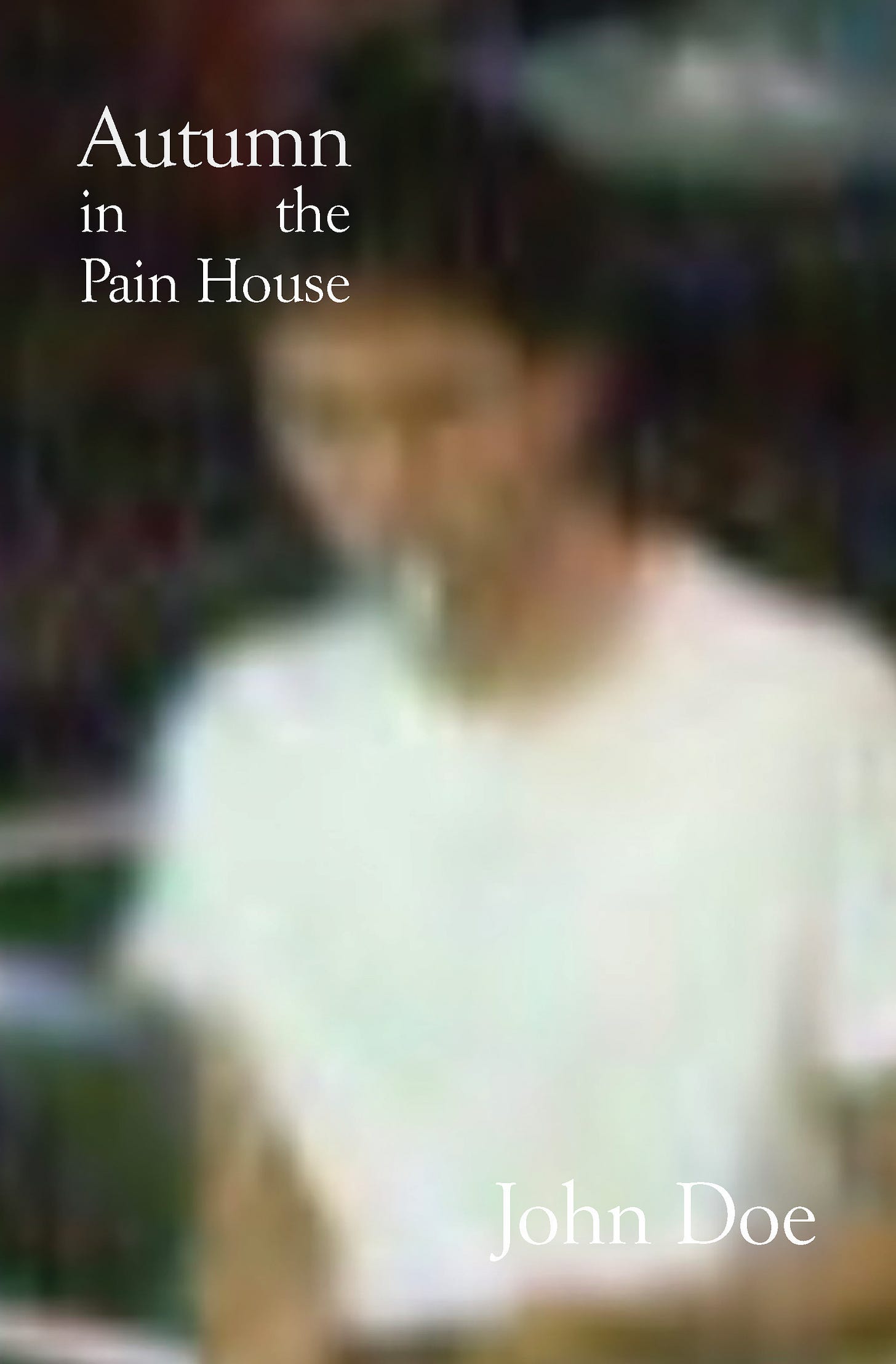Autumn in the Pain House by John Doe (2024, Expat Press)
I Don’t Think You Are Willing To Accept That Men Suffer So Deeply
I’m no expert on contemporary poetry, although I do consider myself a fan of it, and I’m ecstatic when I discover something I can relate to. Other than Ginsberg and Bukowski, however, my appreciation for the form has mostly come through song lyrics, which to me are a form of poetry in themselves. I’ve always viewed song lyrics as poetry, especially when enjoyed separately from the music.
One of my favourite bands, who I deem the singer of as a poet of the highest order, is Pig Destroyer. I know this may seem like a stretch, but there were times during my first reading of Autumn in the Pain House that reminded me of my first time reading Pig Destroyer lyrics like the following, twenty years ago:
“The other day,
I masturbated to pictures of you,
At your birthday party,
They were the only,
ones I still had,
It felt so wrong,
Just like my life.
I hope I'm dead,
by the time you read this.
I love you”
Starbelly by Pig Destroyer
Pig Destroyer lyricist J.R. Hayes being influenced by the highly transgressive works of Dennis Cooper himself, it’s no surprise that such psychosexual melodrama brought to mind my personal discoveries of such rarely glimpsed darkness, mined from the edges of the psyche.
Autumn in the Pain House is as darkly beautiful as any of the works mentioned thus far. It may even be more so for me personally, given its relevance to masculinity’s current spiritual crisis.
Over the course of this book I laughed, and sobbed, multiple times. Being a recovered alcoholic myself, as well as growing up around drug addicts, some now recovered, some now dead, I recognised the world that this collection of poetry was written in.
The God in this book is not the God with the white beard from Sunday school or a Gary Larson cartoon. It is the God sold to you by the Alcoholics Anonymous programme, the one that can be a toaster, or a toothbrush, or whatever you please as long as you don’t dare drink. It is an altogether different God to the one people pray to in films, and books, and TV. It’s a secret God, with a different agenda.
John Doe is not just a man, no matter how much he professes this fact. He is one who is impossibly tainted by modernity, trapped in his own body, and unable to process heartbreak in any kind of conventional manner.
The stream-of-consciousness prose of this book is utterly captivating to read, including the repeated sentences. They give a hypnotic and mesmerising effect, and you feel as though you are holidaying in the mind (or Mind Palace, to use the author's terminology) of someone who has teetered so close to the edge that he’ll never be the same.
The book bounces from egregious pop-culture references and the most obnoxious Zoomer internet slang imaginable, to sentences so profound they made me cry until my face hurt. Several passages made me feel sick, as they brought back memories of dealing with a close family member's heroin addiction.
The blurb on the Expat Press (the publisher) website ends with the sinister and completely true warning: “Addictive, and possibly soul-harming,” which is correct in both instances.
Reading this is akin to mining for hidden treasures, and although at points you will feel the fatigue associated with the toil, you’re never far away from unearthing some precious crystal. Whether it is concerning God, patriotism, addiction, or masculinity, there’s always something profound not far ahead of you.
And in regards to masculinity, and whatever preconceptions you have of what it is, this, for me at least, is a masculinist text. As we move further and further away from the plastic Andrew Tate “red-pill” version of masculinity, it’s refreshing to see something so raw, so visceral in its honesty of what being a man is to John Doe.
Although gender is played with throughout the book, this, at its core, is still a snapshot of what it is to be a man in the 2020’s.
The first two chapters being titled ‘Marxism’ and ‘Greta Thunberg’ may be a focussed effort to dissuade a certain type of reader, but any preconceptions concerning the political position of John Doe need to be utterly discarded if this book is to be enjoyed for the tremendous work of art that it is.
This is a personal work, a deeply personal one, and stands as one of the best indie-lit/alt-lit pieces of the last couple of years.
Painfully self-conscious, John Doe at multiple points compares himself disparagingly to Delicious Tacos. This gentle strain of self-loathing is thematically sound for such a character, but I found so much value, so much heart, so much pain and expression of the difficulty of love in this, that for me, it stands entirely on its own. It has its own voice, its own merit.
As much as I’d love to title this review “Delicious Tacos meets Pig Destroyer,” it’d be hugely derivative.
Autumn in the Pain House is for me, the gold standard for poetry concerning God, alcoholism, substance abuse, lost love, the new United States of America, and anonymity. Highly recommended.
Available now from Expat Press – https://expatpress.com/product/autumn-in-the-pain-house-john-doe/
Follow John Doe on X – https://x.com/pain___house
Follow Expat Press on X – https://x.com/ExpatLitJ


